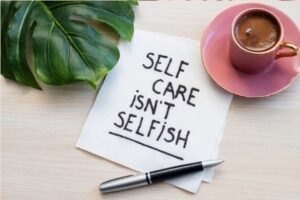Making Self-Care a Daily Practice: Tips for Improving Mental Health

In an epidemic of loneliness, mental health awareness is on the rise, and a focus has been placed on finding tactics to improve mental well-being. Self-care is a key factor in the condition of our mental health — but before you picture bubble baths and pedicures, think again. When it’s incorporated as a regular habit, the outcomes of self-care can be life-changing. What does self-care look like practically? What are its benefits, and how does it positively impact mental health? Take a look at how self-care can be a powerful strategy in your journey to overall wellness.
What is Self-Care?
Self-care is sometimes stigmatized as selfish, a frivolous “extra treat” or a luxury reserved only for those with time to spare — an indulgent massage, for example. And while there’s nothing wrong with a massage, true self-care is so much more significant. As Brynn Fowler, Executive Director with Camber, says, “Self-care is recognizing the ability to promote and maintain wellness while managing stress in a healthy and positive way.”
Because of how beneficial it can be to our overall well-being; self-care has the potential to drastically improve our lives.
“Self-care is not a luxury to pick and choose whether or not you want to do it. It really is something that everyone needs to have in their routines for best health.”
Benefits of Self-Care
Have you ever listened to the emergency guidelines while flying on an airplane? The flight attendants instruct those on the flight that they should first put the oxygen masks on themselves, and then put them on anyone who needs help. This protocol is in place because if you lose oxygen yourself, you cannot help the other people who need assistance. Then no one has enough oxygen to function.
Practicing regular self-care works a lot like this. It allows you to optimize your life, feel better and put your best foot forward. “If you’re practicing self-care, you’re more apt to handle daily stressors that come up, while also building resiliency, so you can help yourself and others,” Fowler explains. To incorporate self-care effectively, a routine can help. The goals of a self-care routine involve:
- Taking care of physical and psychological health
- Managing and reducing stress
- Enhancing awareness of emotional and spiritual needs
- Sustain healthier relationships
- Achieving overall balance in each area of life.
Think these goals sound great? So do we! And one of the best ways to reach these goals is by practicing regular self-care. Survey results show that about 59% of people only practice self-care when they’re already very stressed and getting close to burnout, but this is not the most effective strategy. It’s, instead, making self-care a priority as part of your daily life. In fact, sticking to a self-care routine has many benefits including:
- Enhanced self-confidence
- Reduced stress
- Increased happiness
- Better productivity
- Improved anxiety and depression
- Feeling rested and revitalized
- Lowers chances of heart disease, stroke and cancer
- Adapting to changes more fluidly
- And more!
Self-care ensures that you’re in tune with your body and what your personal needs are. This allows you to better manage your health. Just as life has its ups and downs, so will self-care routines, but it’s essential to keep awareness and make any necessary changes to the routines before our physical and mental health suffer.
Improving Mental Health with Daily Self-Care Practices
Although there are many elements to self-care, physical and mental health are often a top priority. These two areas affect a large part of our daily living, and if they are not maintained it impacts our overall health. However, research shows that engaging in self-care is proven to reduce symptoms of anxiety, depression and stress while increasing coping abilities and happiness levels. But how do you begin a self-care routine to help with mental health?
Self-care starts with those things that help you get out of bed every day. It can be anything — from going to the store to spending time with loved ones, walking outdoors or cuddling up with a good book. If you’re having trouble finding something that fills your cup, try thinking about the things that put a smile on your face, and what helps you to keep going. Try building a Mental Health Toolkit, which can be the building blocks of your self-care routine. Depending on how empty your cup is, self-care practices may take some time and effort on your part before the full effects are noticed.
cuddling up with a good book. If you’re having trouble finding something that fills your cup, try thinking about the things that put a smile on your face, and what helps you to keep going. Try building a Mental Health Toolkit, which can be the building blocks of your self-care routine. Depending on how empty your cup is, self-care practices may take some time and effort on your part before the full effects are noticed.
Another way to think about self-care is to consider the opposite of what has drained you recently. For example, maybe you’re coming off a busy week at work with many interpersonal interactions, and lots of activities with children and others. Smart self-care could look like quiet, solo, restorative activities on your own. But if you’ve been feeling isolated and disengaged from others recently, smart self-care could look like a phone call to a good friend.
For those who may roll their eyes at the thought of self-care and experience thoughts of skepticism about its effectiveness, think about how you’re feeling mentally, physically, emotionally and beyond. What comes up? Is it a sense of peace in a hectic world? Or are there several heightened emotions happening under the surface?
“When you’re feeling stressed, anxious, angry, irritated, burned out and overwhelmed, ask yourself if you’re taking care of yourself and practicing regular self-care,” Fowler says. “Chances are, you’re not, and that’s why you’re feeling this way.”
Modeling Self-Care for Children
 As a caregiver, self-care can feel like the least important item on your to-do list. It’s easy to feel overwhelmed by the mere idea of self-care when you have so much to do for your family. Only 32% of parents feel they have time for self-care!
As a caregiver, self-care can feel like the least important item on your to-do list. It’s easy to feel overwhelmed by the mere idea of self-care when you have so much to do for your family. Only 32% of parents feel they have time for self-care!
But don’t forget that oxygen mask analogy: When you take care of yourself, you’re better equipped to care for your family. Spending time in self-care positions you as a role model for your children, so they can understand the importance of taking care of themselves too.
What to Do When Your Cup is Empty and Self-Care Practices Aren’t Enough?
The purpose of self-care is to feel more energized and ready to take on the world. It allows us to give more of ourselves without draining our energy — which we won’t have if we’re not taking care of ourselves. But when our cup is already empty and coping becomes more difficult, self-care practices might not feel like enough.
If mental health struggles like deeper depression, isolating behaviors, irritability, emotional exhaustion and physical stress/pain are apparent, additional help and support from a therapist or other professional services might be necessary. Use this time as a chance to become more aware of how you are giving away your energy and learn strategies to improve self-care practices, so you don’t have to suffer. Develop a new set of self-care skills and optimize yourself to inspire the self-care practices of others.






